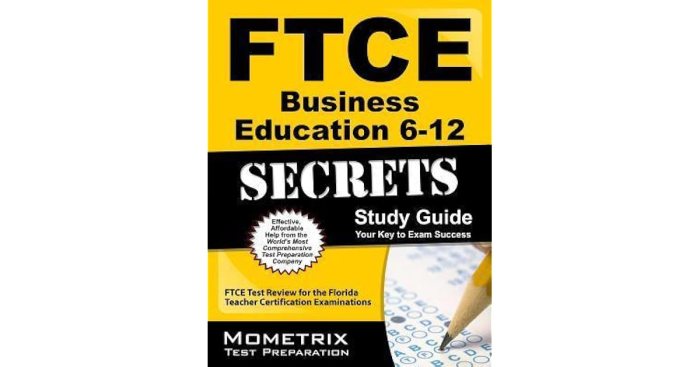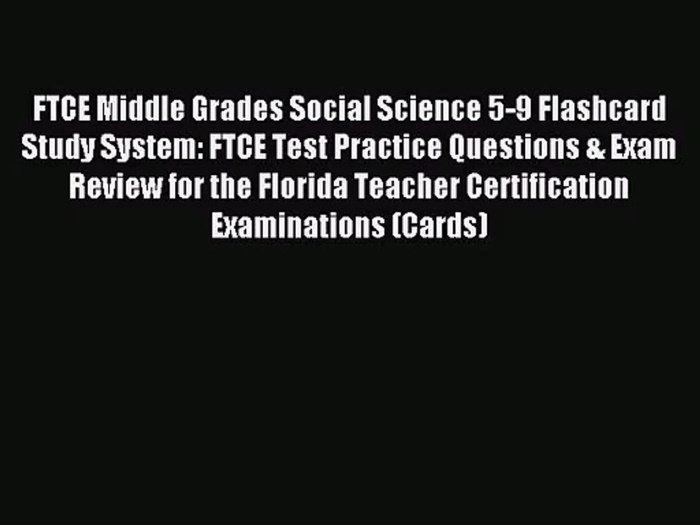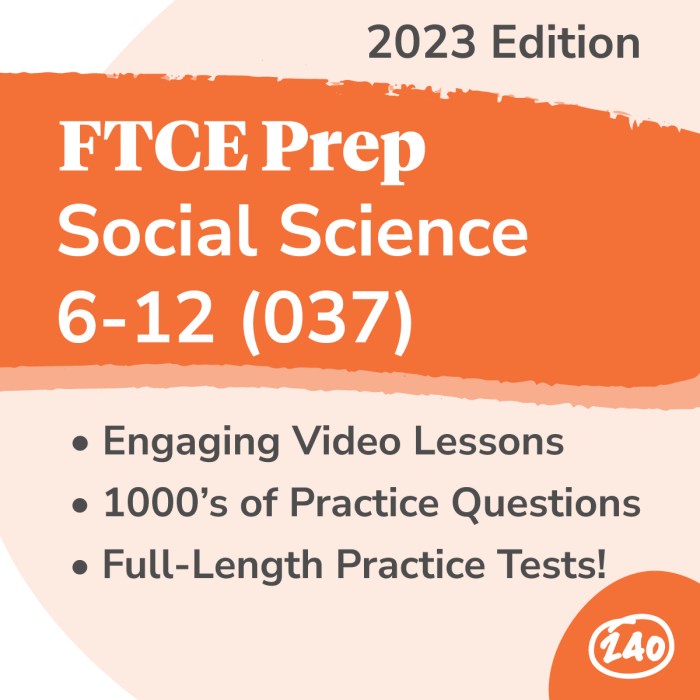Ftce social studies 6 12 – Dive into the fascinating world of FTCE Social Studies 6-12, where history, geography, and civics intertwine to shape young minds. This guide will equip you with the knowledge and skills to navigate the exam confidently and become an exceptional social studies educator.
Throughout this comprehensive guide, we will explore the scope and structure of the FTCE Social Studies 6-12 exam, delve into key concepts and topics, and provide practical strategies for effective teaching. Whether you’re a seasoned educator or just starting your journey, this guide is your roadmap to success.
Content Overview
The FTCE Social Studies 6-12 exam assesses candidates’ knowledge and skills in teaching social studies at the secondary level. The exam covers a broad range of topics, including history, geography, economics, government, and civics.The exam is divided into two subtests:
- Content Knowledge and Application (60%)
- Professional Knowledge and Application (40%)
The Content Knowledge and Application subtest covers the following key concepts:
- Historical thinking and research
- Geography and environmental literacy
- Economics and financial literacy
- Government and civics
- Social studies instruction and assessment
The Professional Knowledge and Application subtest covers the following key concepts:
- Planning and instruction
- Assessment and evaluation
- Classroom management
- Professionalism and ethics
- Diversity and equity
Historical Perspectives: Ftce Social Studies 6 12

Historical knowledge and skills are crucial for teaching social studies. They provide a foundation for understanding the present and predicting the future. By examining historical events and figures, students can develop critical thinking, problem-solving, and decision-making abilities.
Historical events and figures can be used to engage students in meaningful learning experiences. For example, studying the American Revolution can help students understand the causes and consequences of revolution, while exploring the life of Martin Luther King Jr. can teach them about the importance of nonviolent resistance.
Incorporating Historical Inquiry
To effectively incorporate historical inquiry into the classroom, teachers can use a variety of strategies, such as:
- Using primary and secondary sources to allow students to analyze historical evidence.
- Encouraging students to ask questions and develop their own interpretations of historical events.
- Providing opportunities for students to engage in historical research projects.
Geographical Concepts
Geography encompasses the study of the Earth’s physical features, human populations, and the interactions between them. It provides a framework for understanding the world’s diverse landscapes, cultures, and economies.
Spatial Relationships
Spatial relationships describe the relative positions and distances between geographical features. These concepts include direction, distance, and scale. Understanding spatial relationships is essential for interpreting maps and analyzing geographical data.
- Direction:Determining the location of one place relative to another, using cardinal (north, south, east, west) or intermediate (northeast, southwest) directions.
- Distance:Measuring the separation between two points, often expressed in kilometers or miles.
- Scale:Representing the relationship between the size of an object on a map or globe and its actual size on Earth.
Map Analysis, Ftce social studies 6 12
Maps are essential tools for geographers. They provide a visual representation of geographical features and spatial relationships. Map analysis involves interpreting map symbols, scales, and projections to extract information about the physical and human landscapes.
- Map Symbols:Understanding the symbols used to represent different features on maps, such as points, lines, and areas.
- Map Scales:Recognizing the relationship between the distance on a map and the corresponding distance on Earth.
- Map Projections:Understanding how the curved surface of the Earth is represented on a flat map.
Geographical Literacy
Geographical literacy is the ability to understand and use geographical concepts to make informed decisions. It is essential for comprehending global issues, such as climate change, resource allocation, and cultural diversity. Geographically literate individuals can identify patterns, analyze data, and make connections between different parts of the world.
Civic Education

Civic education is essential for fostering informed and active citizens. It involves teaching the principles of American government and citizenship, promoting civic engagement and responsibility, and encouraging critical thinking about societal issues.
Principles of American Government and Citizenship
The principles of American government include:
- Popular sovereignty: The government’s authority comes from the people.
- Limited government: The government has limited powers, as defined by the Constitution.
- Separation of powers: The government is divided into three branches (legislative, executive, judicial) to prevent any one branch from becoming too powerful.
- Checks and balances: Each branch of government has powers to limit the other branches.
Citizenship involves rights and responsibilities, such as:
- Voting
- Running for office
- Serving on juries
- Paying taxes
- Obeying the law
Strategies for Teaching Civic Engagement and Responsibility
Effective strategies for teaching civic engagement and responsibility include:
- Service learning: Engaging students in community service projects to connect them with real-world issues.
- Project-based learning: Having students work on projects that involve research, problem-solving, and collaboration on civic issues.
- Simulations and role-playing: Creating mock elections, debates, or town hall meetings to give students hands-on experience with civic processes.
- Guest speakers: Inviting community leaders, politicians, or activists to share their perspectives and experiences.
- Current events discussions: Discussing current events and encouraging students to form their own opinions and engage in informed debate.
Role of Social Studies in Fostering Informed and Active Citizens
Social studies plays a vital role in fostering informed and active citizens by:
- Teaching students about history, government, economics, and geography to provide them with the knowledge and skills necessary for civic engagement.
- Encouraging critical thinking and problem-solving skills to help students analyze societal issues and develop informed opinions.
- Promoting empathy and understanding of diverse perspectives to foster a sense of community and civic responsibility.
By incorporating civic education into social studies curricula and utilizing effective teaching strategies, educators can empower students to become active and informed citizens who contribute to their communities and society.
Economics and Personal Finance

Economics is the study of how individuals, societies, and countries make choices to allocate scarce resources to satisfy their wants and needs. It is a complex subject, but there are some basic concepts that can be taught in the classroom to help students understand how the economy works.
Supply and Demand
Supply and demand is one of the most basic concepts in economics. Supply refers to the amount of a good or service that producers are willing and able to sell at a given price. Demand refers to the amount of a good or service that consumers are willing and able to buy at a given price.
The price of a good or service is determined by the interaction of supply and demand.
Markets
Markets are places where buyers and sellers come together to trade goods and services. There are many different types of markets, including stock markets, bond markets, and commodity markets. Markets play a vital role in the economy by allowing buyers and sellers to find each other and agree on a price for goods and services.
Financial Literacy
Financial literacy is the ability to understand and manage your personal finances. It is an important life skill that can help you make informed decisions about saving, investing, and spending. There are many things you can do to improve your financial literacy, such as taking a class, reading books, or talking to a financial advisor.
Assessment Strategies
Assessment is a crucial component of teaching and learning, providing valuable insights into student understanding and progress. To effectively evaluate student learning in social studies, a variety of assessment strategies should be employed.
Assessments can be categorized into two main types: formative and summative. Formative assessments are ongoing evaluations that provide feedback to students and teachers during the learning process. Summative assessments, on the other hand, are used to measure student achievement at the end of a unit or course.
To ace the FTCE Social Studies 6-12 exam, it’s essential to master various concepts. One such concept is finding the midpoint of a line segment. This technique is crucial for solving geometry problems accurately. To enhance your understanding, refer to this comprehensive guide: find the midpoint of rs . By mastering this skill, you’ll boost your confidence and improve your chances of success in the FTCE Social Studies 6-12 exam.
Formative Assessments
- Exit Tickets:Brief quizzes or reflections completed at the end of a lesson to assess understanding.
- Class Discussions:Interactive discussions that allow teachers to gauge student comprehension and participation.
- Observations:Monitoring student behavior, engagement, and participation during lessons.
- Homework Assignments:Short assignments that provide opportunities for students to practice and reinforce concepts.
Summative Assessments
- Essays:Extended written responses that require students to demonstrate their knowledge, analysis, and writing skills.
- Projects:Creative or research-based assignments that allow students to showcase their understanding and application of concepts.
- Presentations:Oral presentations that assess students’ communication and research skills.
- Standardized Tests:External assessments that measure student achievement against established standards.
It is important to use a variety of assessment methods to measure student progress. This provides a comprehensive understanding of student strengths and weaknesses and allows for targeted instruction.
al Resources

Effective social studies teaching requires access to high-quality resources that engage students, support differentiated instruction, and align with curriculum standards. These resources can include websites, textbooks, lesson plans, and professional development opportunities.
These resources provide educators with a wealth of materials and strategies to make social studies learning more meaningful and effective.
Websites
- National Council for the Social Studies (NCSS):The NCSS website offers a wide range of resources, including lesson plans, articles, and professional development opportunities.
- Library of Congress:The Library of Congress website provides access to a vast collection of primary and secondary sources, including documents, images, and videos.
- Smithsonian National Museum of American History:The Smithsonian National Museum of American History website offers interactive exhibits, lesson plans, and other resources on American history.
Textbooks
- History Alive! The United States Through Industrialism (2015) by McGraw-Hill Education:This textbook provides a comprehensive overview of U.S. history from the colonial era to the present day.
- World History: Patterns of Interaction (2017) by Pearson:This textbook explores the major themes and events in world history, from ancient civilizations to the present day.
- Government in America: People, Politics, and Policy (2018) by Cengage Learning:This textbook provides a comprehensive overview of the American political system.
Lesson Plans
- Teaching Tolerance:Teaching Tolerance provides a wide range of lesson plans on topics such as diversity, inclusion, and social justice.
- Newsela:Newsela provides current event articles and lesson plans that are aligned with curriculum standards.
- Edutopia:Edutopia provides a variety of lesson plans, articles, and other resources on innovative teaching practices.
Professional Development Opportunities
- National Council for the Social Studies (NCSS) Annual Conference:The NCSS Annual Conference offers a variety of professional development opportunities, including workshops, presentations, and networking opportunities.
- American Historical Association (AHA) Annual Meeting:The AHA Annual Meeting offers a variety of professional development opportunities, including workshops, presentations, and networking opportunities.
- Organization of American Historians (OAH) Annual Meeting:The OAH Annual Meeting offers a variety of professional development opportunities, including workshops, presentations, and networking opportunities.
Professional Development

In the ever-evolving landscape of education, professional development (PD) is an indispensable tool for social studies educators to stay abreast of the latest pedagogical approaches, content knowledge, and technological advancements.
PD enables teachers to enhance their knowledge and skills, which directly contributes to improved student outcomes. Through workshops, conferences, and other opportunities, educators can:
Professional Organizations
- Join professional organizations like the National Council for the Social Studies (NCSS) and the American Historical Association (AHA) to connect with colleagues, access resources, and stay informed about best practices.
Conferences and Workshops
- Attend conferences and workshops organized by NCSS, AHA, and other reputable institutions to learn from experts, share ideas, and explore new teaching strategies.
Contribution to Improved Student Outcomes
- Enhanced teacher knowledge and skills translate into more engaging and effective lessons, leading to improved student understanding, critical thinking, and historical empathy.
- Exposure to diverse perspectives and innovative approaches empowers teachers to create inclusive and equitable learning environments that foster student success.
FAQs
What is the scope of the FTCE Social Studies 6-12 exam?
The FTCE Social Studies 6-12 exam covers a wide range of topics, including American history, world history, geography, economics, and civics.
How can I prepare for the FTCE Social Studies 6-12 exam?
There are many ways to prepare for the FTCE Social Studies 6-12 exam, including studying the official study guide, taking practice tests, and attending review courses.
What are some tips for teaching social studies effectively?
Some tips for teaching social studies effectively include using a variety of teaching methods, incorporating primary sources, and making learning relevant to students’ lives.